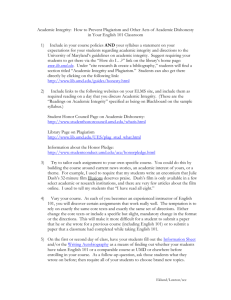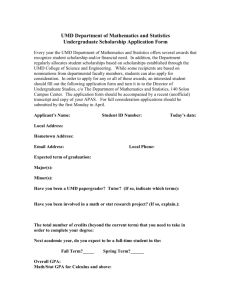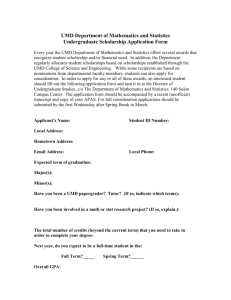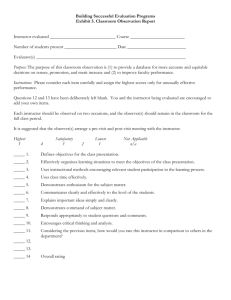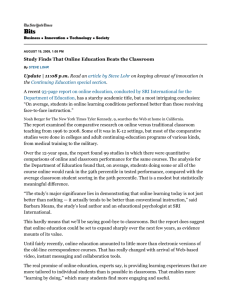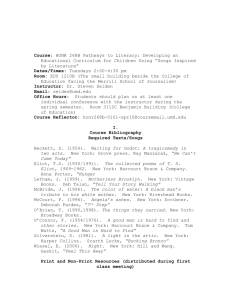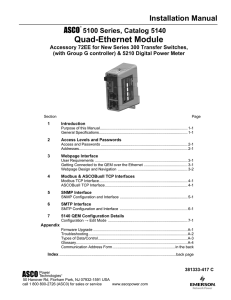Description of course - University Honors
advertisement
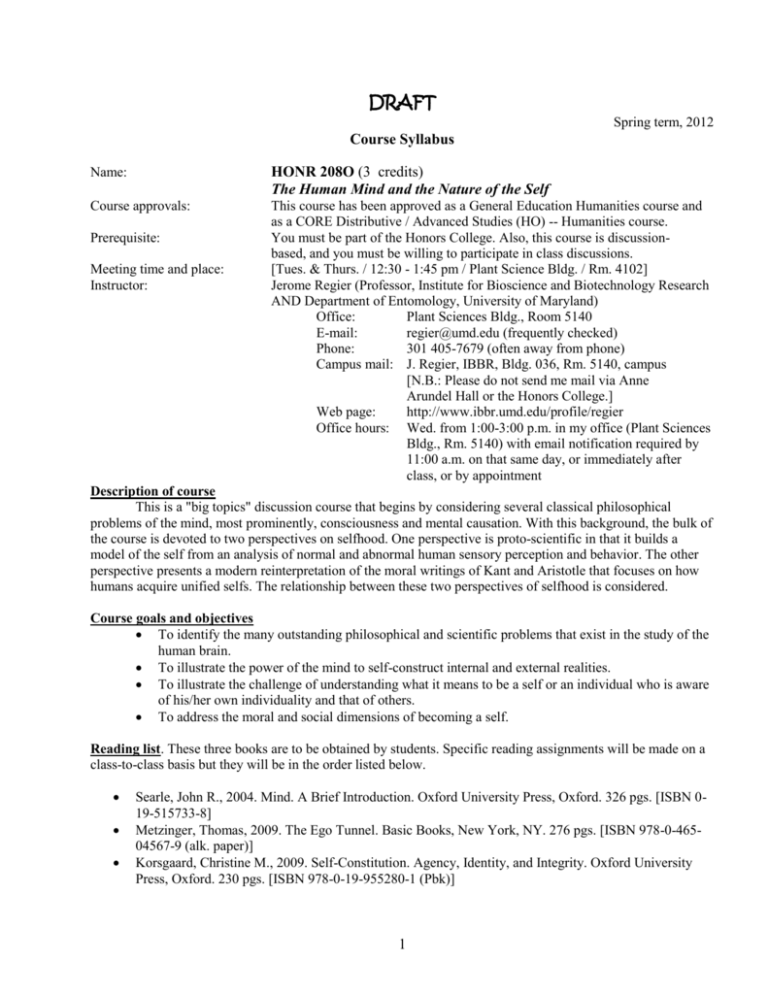
DRAFT Spring term, 2012 Course Syllabus Name: HONR 208O (3 credits) The Human Mind and the Nature of the Self Course approvals: This course has been approved as a General Education Humanities course and as a CORE Distributive / Advanced Studies (HO) -- Humanities course. You must be part of the Honors College. Also, this course is discussionbased, and you must be willing to participate in class discussions. [Tues. & Thurs. / 12:30 - 1:45 pm / Plant Science Bldg. / Rm. 4102] Jerome Regier (Professor, Institute for Bioscience and Biotechnology Research AND Department of Entomology, University of Maryland) Office: Plant Sciences Bldg., Room 5140 E-mail: regier@umd.edu (frequently checked) Phone: 301 405-7679 (often away from phone) Campus mail: J. Regier, IBBR, Bldg. 036, Rm. 5140, campus [N.B.: Please do not send me mail via Anne Arundel Hall or the Honors College.] Web page: http://www.ibbr.umd.edu/profile/regier Office hours: Wed. from 1:00-3:00 p.m. in my office (Plant Sciences Bldg., Rm. 5140) with email notification required by 11:00 a.m. on that same day, or immediately after class, or by appointment Prerequisite: Meeting time and place: Instructor: Description of course This is a "big topics" discussion course that begins by considering several classical philosophical problems of the mind, most prominently, consciousness and mental causation. With this background, the bulk of the course is devoted to two perspectives on selfhood. One perspective is proto-scientific in that it builds a model of the self from an analysis of normal and abnormal human sensory perception and behavior. The other perspective presents a modern reinterpretation of the moral writings of Kant and Aristotle that focuses on how humans acquire unified selfs. The relationship between these two perspectives of selfhood is considered. Course goals and objectives To identify the many outstanding philosophical and scientific problems that exist in the study of the human brain. To illustrate the power of the mind to self-construct internal and external realities. To illustrate the challenge of understanding what it means to be a self or an individual who is aware of his/her own individuality and that of others. To address the moral and social dimensions of becoming a self. Reading list. These three books are to be obtained by students. Specific reading assignments will be made on a class-to-class basis but they will be in the order listed below. Searle, John R., 2004. Mind. A Brief Introduction. Oxford University Press, Oxford. 326 pgs. [ISBN 019-515733-8] Metzinger, Thomas, 2009. The Ego Tunnel. Basic Books, New York, NY. 276 pgs. [ISBN 978-0-46504567-9 (alk. paper)] Korsgaard, Christine M., 2009. Self-Constitution. Agency, Identity, and Integrity. Oxford University Press, Oxford. 230 pgs. [ISBN 978-0-19-955280-1 (Pbk)] 1 Calendar [ = 29 class sessions] Jan 26 FIRST DAY OF CLASS, INTRODUCTION, NO READING ASSIGNMENT Jan 31, Feb 2 Feb 7, 9 Feb 14, 16 Feb 21, 23 Feb 28, Mar 1 Mar 6, 8 FIRST RESPONSE PAPER DUE ON MARCH 6 Mar 13, 15 Mar 20, 22 SPRING BREAK, NO CLASS! Mar 27, 29 Apr 3, 5 Apr 10, 12 SECOND RESPONSE PAPER DUE ON APRIL 12 Apr 17, 19 Apr 24, 26 May 1, 3 May 8, 10 LAST DAY OF CLASS, FINAL PAPER DUE ON MAY 10 Conduct of the course. Class will consist of group discussion, consistent with the seminar format and the expansive themes that characterize Honors seminars. During class, the instructor will solicit comments on questions raised by the day's assigned readings. Discussion will principally take the form of student / instructor dialog. Students should come prepared to contribute to each and every class. Grading procedures and expectations of students. Class discussion will be 40% of the final grade. Participation in terms of questions, responses to questions, and comments will be expected. Students will need to complete reading assignments prior to class in order to contribute to the discussion in an intelligent and focused manner. There will be three writing assignments -- two response papers (~5 pages each, double-spaced; each worth 15% of final grade) and one longer paper (~10-15 pages, double-spaced; worth 30% of final grade). Each paper should begin with a title. Not included in the just-stated page limits for the text are footnotes and/or full references to be placed at the end. All footnotes and/or references must refer to specific statements in the report, and these should be identified either with numbers or abbreviated references (e.g., Smith et al., 2009) in the text itself. All substantive statements need to be so cited. The University of Maryland Honor Pledge -I pledge on my honor that I have not given or received any unauthorized assistance on this examination. (see http://www.shc.umd.edu/SHC/HonorPledgeInformation.aspx; see also http://www.testudo.umd.edu/soc/dishonesty.html) -- should be transcribed at the bottom of all papers and signed (electronically). The report should be delivered as an email attachment in ".doc" or ".docx" format to "regier@umd.edu", using "HONR 208O paper" as a subject line. Unless the instructor acknowledges receipt with a return email, you should assume that the report is not yet received. Your report will be graded on content (e.g., thoughtfulness, thoroughness, logic) and style (clarity, grammar, spelling, composition). A "response paper" should be an essay written in response to a discussion point raised in class and/or in one of the assigned readings, covering something not discussed or not extensively discussed in class. It should be argumentative in nature but should provide evidence from differing perspectives. Solely descriptive reports are not acceptable. In building your argument, other sources of information should be cited. While your personal view is valuable, it should be a view that is explicitly supported by published sources that are attributed to a specific person or persons. Only carefully reasoned arguments should be presented. Students are encouraged, but not required, to talk with the instructor about their proposed topics of these response papers prior to beginning the writing process. The response papers are due anytime before or on March 6 (paper #1) and April 12 (paper #2). The longer paper may be on a topic chosen by the student but with the 2 mandatory prior approval of the instructor. Please allow sufficient time, as deciding on a topic may involve some prior research. The topic selected should relate to the general subject of the course but can focus on a topic or reading outside the assigned readings. Again, the report should be analytical and have a thesis, and not be entirely descriptive. It should be well referenced. You are not discouraged from, and perhaps even encouraged to, draw extensively from course materials for comparison and contrast in writing this paper. Alternatively, you may write your longer paper on the following topic without prior permission from the instructor: A comparison of the views of Thomas Metzinger and Christine Korsgaard on the nature of selfhood. The "longer" paper is due at or anytime before the start of class on May 10. There will be no final exam. This course does not offer a no-grade / pass-fail option. Students who foresee obligations that would keep them from attending class should not enroll in this course. Reports handed in late will be reduced by one letter grade, unless an extension (for cause) has been arranged with the instructor prior to the deadline. Attendance. As 40% of the grade is dependent on performance during class, attendance is essentially required. Arrangements for (rarely) missed classes can be made by directly contacting the instructor. Academic Integrity. Submitted reports are to be the efforts of individual class members only, with all cited thoughts properly referenced. The University of Maryland's Honor Pledge should be followed (see http://www.shc.umd.edu/SHC/HonorPledgeInformation.aspx and http://www.testudo.umd.edu/soc/dishonesty.html). Statement on Disabilities. If you have a documented disability and wish to discuss academic accommodations, please contact the instructor as soon as possible. 3
